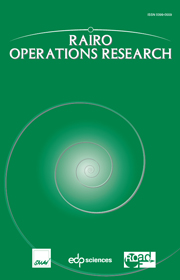Article contents
Solving multi-agent scheduling problems on parallel machineswith a global objective function
Published online by Cambridge University Press: 07 March 2014
Abstract
In this study, we consider a scheduling environment with m(m ≥ 1) parallel machines.The set of jobs to schedule is divided into K disjoint subsets. Each subset of jobs isassociated with one agent. The K agents compete to perform their jobs on commonresources. The objective is to find a schedule that minimizes a global objective functionf 0, while maintaining the regularobjective function of each agent, f k, at a level nogreater than a fixed value, εk (fk ∈ {fkmax, ∑fk}, k = 0, ..., K). This problem is a multi-agent schedulingproblem with a global objective function. In this study, we consider the casewith preemption and the case without preemption. If preemption is allowed, we propose apolynomial time algorithm based on a network flow approach for the unrelated parallelmachine case. If preemption is not allowed, we propose some general complexity results anddevelop dynamic programming algorithms.
- Type
- Research Article
- Information
- RAIRO - Operations Research , Volume 48 , Issue 2: Isco 2012, guest editors Nelson Maculan, A. Ridha Mahjoub, Eduardo Uchoa , April 2014 , pp. 255 - 269
- Copyright
- © EDP Sciences, ROADEF, SMAI, 2014
References
- 14
- Cited by


